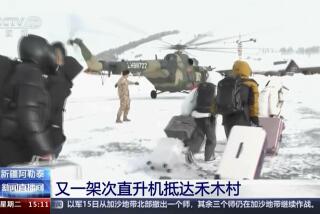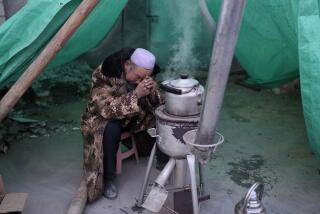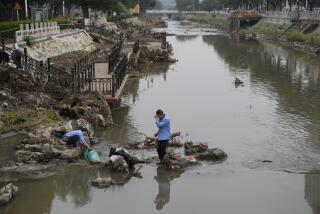As New Year nears, China is snowed in
Beijing
When much of the world’s most populous country grinds to a weather-induced halt, chaos quickly follows. When it occurs just before Chinese New Year, a time when millions of migrant workers rush home for their only visit of the year, the human suffering is difficult to calculate.
“My 12-year-old daughter just called and said, ‘Daddy, when are you coming back, you promised to be here yesterday,’ ” said Luo Qunyi, 35, a construction worker from Hunan stranded in Guangdong. “It just breaks your heart.”
China is in the throes of its worst winter storm in half a century as ice, sleet and record snowfalls blanket the nation’s heartland. At least 50 deaths have been linked to the weather, including two dozen people killed when a bus plunged 130 feet off a mountain road in the southern province of Guizhou, according to state media reports.
The storm, expected to last several more days, has shut down at least 19 airports and brought traffic accidents, food shortages and power cuts. Millions are staying in makeshift shelters. In Shanghai, about 38,000 rail passengers spent Tuesday night in the main railway station, underground garages and nearby public schools when train service was canceled.
Much in China tends to be outsized, and that includes its disasters. Beijing has mobilized almost 500,000 troops to hand out food and clear bottlenecks as coal supplies decline to two days’ worth in some cities. The government also has promised at least $30 million in emergency funding to hard-hit provinces and ordered insurers to expedite payouts.
Guangdong province in the south, home to legions of factories, has been particularly hard hit as local authorities open restaurants, government offices and stadiums to exhausted travelers.
In a bid to ease the crush, officials have warned millions of workers to give up on going home, obtain refunds for their tickets and return to company dorms. The move has spurred anger and disappointment.
Wary that frustration could boil over into unrest, Premier Wen Jiabao made a well-publicized visit to Changsha train station in central Hunan province to reassure the public.
“Let me express my apologies for you all having been stuck here,” Wen said through a megaphone.
Chinese New Year is akin to Thanksgiving, Christmas and New Year’s Eve wrapped into one, and many workers stretch the weeklong holiday that begins Feb. 6 into a month of eating, meeting relatives, watching fireworks and observing new year’s rituals.
On the economic front, the storm has cost at least $2.2 billion as supply chains are cut, property is damaged and energy and food shipments slow to a trickle in some areas.
Rail employees in Hunan reportedly have been carrying food along snow-clogged tracks to reach passengers trapped on halted trains, and 20,000 vehicles are stranded along the main highway between Guangdong and Hunan, state media reported.
Transportation bottlenecks also could affect Chinese shipments to the United States, said Art Wong, a spokesman at the Port of Long Beach, though the slowing U.S. economy has reduced orders from China.
Beijing has beefed up its emergency response system after a spate of flu epidemics and various food, toy and pharmaceutical safety scandals.
“At the same time, the response time could have been better,” said Peng Zongchao, an assistant professor with Qinghua University’s Center for Crisis Management Research in Beijing.
Ma Kaimei, 45, a farmer who managed to return to her hometown in the eastern province of Jiangsu from Beijing as the storm was building, said she was impressed by how quickly snowplows were mobilized and other emergency measures implemented.
“And Premier Wen showed real concern for farmers and factory workers,” she said. “I was very satisfied with what he did.”
Even at the best of times, China’s transportation network is stretched to the breaking point around Chinese New Year. A record 178 million rail travelers are expected this holiday.
The strain is intensified by a planned reduction this year in the number of extended holidays, encouraging more people to return home for Chinese New Year.
In Shanghai, the nation’s commercial capital, more than 3,000 people checked into hospitals with weather-related injuries, including broken bones, and dozens of houses were destroyed in the storm, according to media reports.
“I just hope the weather improves and we can make it,” said Luo, the worker stranded in Guangdong.
Yin Lijin of The Times’ Beijing Bureau and Times staff writer Don Lee in Shanghai contributed to this report.
More to Read
Sign up for The Wild
We’ll help you find the best places to hike, bike and run, as well as the perfect silent spots for meditation and yoga.
You may occasionally receive promotional content from the Los Angeles Times.






